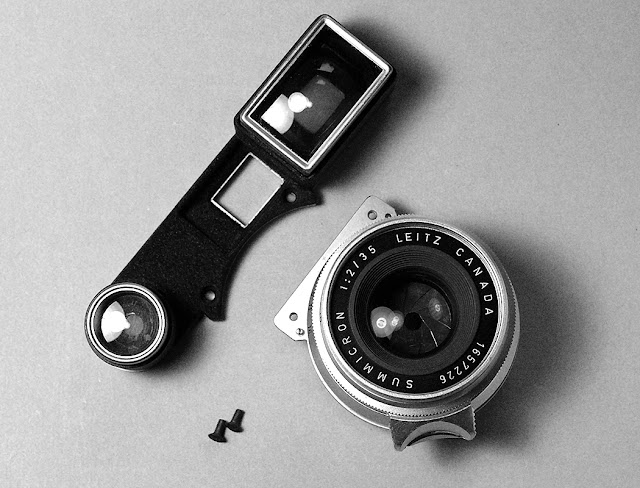Leitz 35mm f/2 Summicron on Leica M240
By Heinz Richter
A few days ago a reader on Facebook asked the question if a 35mm f/2 Summicron with the viewfinder corrector (commonly referred to as goggles) for Leica M3 cameras can be used on other Leica cameras or if it requires any modification to focus correctly.
The Leica M3 only had viewfinder frames for 50mm, 90mm and 135mm lenses. For that reason Leitz issued special versions of some of their 35mm lenses with a viewfinder corrector which was designed to activate the 50mm viewfinder frame and widened the field of view to that of a 35mm lens.
Many of those lenses are still in circulation and it is a valid question if these lenses can be used on other Leica cameras as well.
35mm f/2 Summicron (left) and 35mm f/3.5 Summaron for Leica M3
The short answer is “yes”. Just like on the M3, these lenses will activate the 50mm frame and widen the field of view to that of a 35mm lens and just like on the M3, accurate focusing is maintained throughout the entire focusing range of the lens. However, keep in mind that widening the viewfinder field will result in a smaller viewfinder image and focusing will not be as easy or as accurate because this also shortens the effective base length of the rangefinder.
Obviously, this extra viewfinder attachment is unnecessary with other M cameras and the question is if it can be removed. Removal is not difficult. The 35mm f/3.5 Summaron, for instance, had a small set screw which, when loosened, allowed the viewfinder to be removed. With the 35mm f/2 Summicron it requires a small screwdriver to remove a couple of screws to remove the viewfinder.
Loosening the set screw on the Summaron will allow the viewfinder to be removed.
Removing the two small screws on the Summicron will allow the removal of the viewfinder
35mm f/2 Summicron with viewfinder removed
A quick check will reveal that the lenses will focus accurately at infinity. But at anything closer than that, the focusing will be off without the viewfinder piece. The discrepancy is relatively small at distances close to infinity, but it will get progressively worse when focusing closer.
Subsequently the answer is that these lenses can only be focused accurately with the viewfinder in place. Removing it will serve no purpose at all. This is the case with all Leica M cameras.
For other articles on this blog please click on Blog Archive in the column to the right
To comment or to read comments please scroll past the ads below.
All ads present items of interest to Leica owners.
_______________________________________________________________________
To comment or to read comments please scroll past the ads below.
All ads present items of interest to Leica owners.
_______________________________________________________________________
Buy vintage Leica cameras from America's premier Leica specialist
Buy vintage Leica cameras from
America's premier Leica specialist
Click on image to enlarge
Click on image to enlarge
Click on image to enlarge
Click on image to enlarge
Click on image to enlarge
Click on image to enlarge





















Does anyone know WHY the focus would get progressively worse at closer distances? If the lens' focus is correct at infinity then the back-focus must be identical (to non-goggled lenses); is the focussing helicoid (pitch) therefore somehow different? Sorry if this is a dumb question but I'd really like to know!
ReplyDeleteActually, that is a very good question. It obviously has to do with the optical correction of the viewfinder to simulate the filed of view of a 35mm lens. Of course the rangefinder has to indicate proper focus at infinity either way, but, as you indicated, the pitch of the focusing cam is different to compensate for the added viewfinder piece.
DeleteYou can remove the goggles and use it on other M's, but it will still call up the 50mm framelines.
ReplyDeleteNo, you cannot use the lenses without the goggles on other Leica M cameras. It will render the rangefinder increasingly inaccurate as you focus at distances closer than infinity. The article clearly mentions that.
Delete